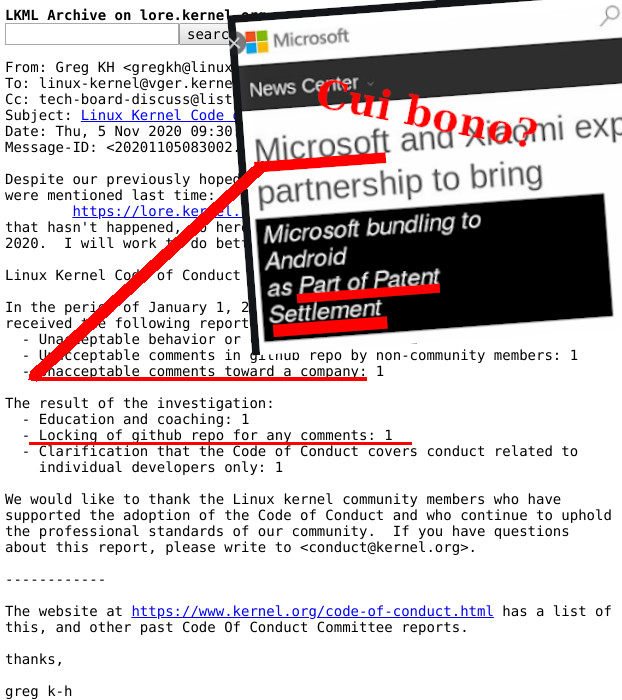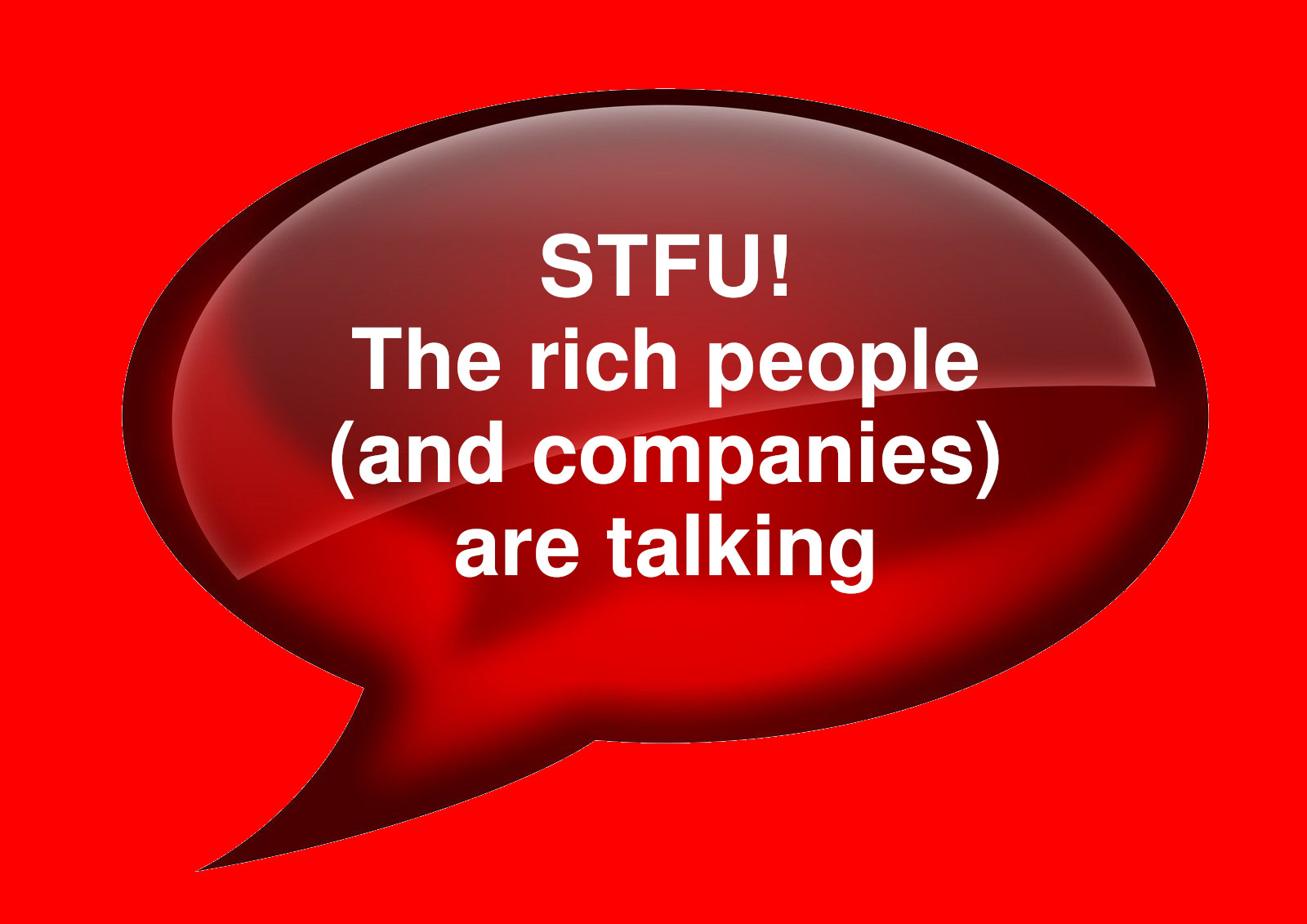

YESTERDAY the Linux Foundation (LF) issued this report from its CoC team ("Linux Kernel Code of Conduct Committee: October 2020 report"). Benjamin Henrion gave us the heads-up. "In the period of January 1, 2020 through October 31, 2020 the Committee received the following reports," it said. That specified incidents in Microsoft GitHub, stating that "[l]ocking of github repo for any comments" was the resolution (censorship by the LF in a Microsoft censorship platform) and "Unacceptable comments toward a company" (to the LF's credit, the response to that was: "Clarification that the Code of Conduct covers conduct related to individual developers only," i.e. corporations aren't people). We previously took note of committee members being corporate types, even from companies that led the verbal elimination drive (eliminating words). Again, to the LF's credit, we aren't quite seeing draconian moves, but that says too little about 'chilling effect' and self-censorship. When was the last time Torvalds gave some company the finger (literally, not metaphorically)?
 As a side note, Richard Stallman (RMS) has no free speech rights anymore. Just over a year ago he spoke in defence of a deceased friend and lost his job/home for doing so, after the press had maliciously mischaracterised his comments. The reason we aren't yet publishing an interview with RMS is that some people apparently gag/suppress him, or cause him to at least worry about the consequences. People who read our IRC logs might be familiar with more pertinent details. The GNU/Guix petition (from many IBM employees), for instance, may have already led to self-censorship, which is the last thing any freedom-centric community should tolerate. We don't know if the FSF too plays a role in it, but it seems clear that RMS is reluctant to talk freely (or openly) and that's a great shame because his voice is important. He clarified to me that GNU certainly does not have a "CoC" (what they have is inherently different, by both intention and design), but last year we learned that the FSF was censoring perfectly legitimate and polite messages in the mailing lists. So as implicit and subtle as it may be/seem, we already have free speech deficit. It would not be easy to justify this either (we have seen some of the censored messages and they're totally cordial and innocuous).
As a side note, Richard Stallman (RMS) has no free speech rights anymore. Just over a year ago he spoke in defence of a deceased friend and lost his job/home for doing so, after the press had maliciously mischaracterised his comments. The reason we aren't yet publishing an interview with RMS is that some people apparently gag/suppress him, or cause him to at least worry about the consequences. People who read our IRC logs might be familiar with more pertinent details. The GNU/Guix petition (from many IBM employees), for instance, may have already led to self-censorship, which is the last thing any freedom-centric community should tolerate. We don't know if the FSF too plays a role in it, but it seems clear that RMS is reluctant to talk freely (or openly) and that's a great shame because his voice is important. He clarified to me that GNU certainly does not have a "CoC" (what they have is inherently different, by both intention and design), but last year we learned that the FSF was censoring perfectly legitimate and polite messages in the mailing lists. So as implicit and subtle as it may be/seem, we already have free speech deficit. It would not be easy to justify this either (we have seen some of the censored messages and they're totally cordial and innocuous).
LF folks like Greg K-H want to paint the LF as totally tolerant and reasonable regarding people's speech, but we may never know how many people became afraid/reluctant to speak freely (or "openly" as the LF might put it). How are we to speak about morality and immorality of some corporations when people already -- by the LF's own admission -- file formal complaints like "Unacceptable comments toward a company"?
As a side note, this past week we became aware of a disturbing CoC incident through Planet Python [1,2]. While it's somewhat vague (missing details), there's enough to see in there and generally regard as a cautionary tale w.r.t. the libellous potential (a possibility of slander) of CoC complaints -- to the point where public apologies need to be made by enforcers of the CoC rather than the accused or accuser.
It takes much effort and collective will -- one's willingness to take offence or have one's feelings/beliefs challenged -- to promise and secure free speech, whereas it takes little effort (or weak reasoning) to crush it. ⬆
Related/contextual items from the news:
We, the NumFOCUS Code of Conduct Enforcement Committee, issue a public apology to Jeremy Howard for our handling of the JupyterCon 2020 reports. We should have done better. We thank you for sharing your experience and we will use it to improve our policies going forward.
We acknowledge that it was an extremely stressful experience, being summoned to an interview with several members of a committee, after a week had passed, and without knowing the nature of the complaint. We apologize for causing this stress and will work to improve our process to avoid this from happening in the future.
To clarify a crucial miscommunication that we take responsibility for: At the time of the interview, the committee had not determined that there was a violation of the code of conduct, only that there were two complaints filed and being examined. We apologize for not communicating that clearly from the beginning. We have not recommended any enforcement actions. We had asked to postpone the posting of the talk to the JupyterCon shared space until the complaints are resolved. We realize now that we used overly charged language and miscommunicated the stage of the investigation when discussing the complaints, i.e. saying a violation occurred. We should have been clearer saying multiple complaints have been made and the alleged violation investigation had not been resolved.
The context In his keynote at JupyterCon 2020, Jeremy Howard gave a point-by-point rebuttal of a presentation given at JupyterCon two years prior. Two attendees filed reports to the CoC committee as they felt that the content was unwelcoming and disrespectful.
Finding The board of directors voted that the talk of Jeremy Howard adhered to the JupyterCon Code of Conduct. Jeremy’s talk offers the kind of exchange of ideas that makes an intellectual community vibrant and healthy.